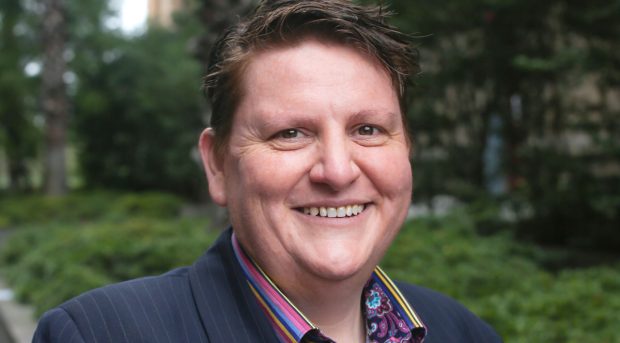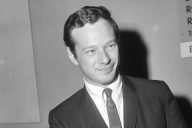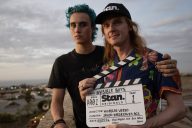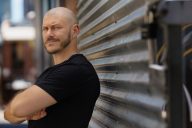One of a kind, Ro Allen is the first Victorian Commissioner for Gender and Sexuality. She tells Matt Myers about the challenges, surprises and inspirational moments that have made up her first year in office.
How do you feel about being in this role?
Ro Allen: It’s an honour and privilege to be the first Commissioner for Gender and Sexuality. It’s a role about education and awareness, rather than one about regulatory and complaints. It’s also one where I’m given free range to work right across our community, and the broader community to educate.
What are some of the biggest issues you’ve had to face?
I think some of the trauma that affected out community, like the Orlando shooting and the possibility of a plebiscite. The plebiscite was huge, in that we worked with the community to fight against it. They’re some of the broader issues, but there’s also the day-to-day discrimination that people experience and the fact that there’s so much to do. I have to pick and choose really, because I can’t do it all in the first year, as people keep reminding me. I think that’s been my biggest issue – just trying to pick ten projects and not twenty.
The Victorian Government’s expungement scheme and apology to past LGBTI ‘criminals’ must have been a monumental occasion?
That was probably where I think parliament was at its best, and the full parliament too. Any members of government who didn’t agree with it, didn’t turn up. The government and the opposition were united in their apology. I think the saddest thing was when one of the gentleman involved said to me how it was a beautiful day, but he was just sorry his mother wasn’t there to see it. She had suffered the shame too, and we have to remember that it also affected families.
You headed up the Federation Square vigil for the Orlando tragedy. When you think back to that event, what sticks in your mind the most?
Three thousand people singing Somewhere Over The Rainbow, with a mass choir. It was a really powerful moment. There were also the breath-taking speeches, which were so on the mark, and the community support was just phenomenal.
During these occasions, the rainbow flag flew over Parliament House, which is quite a milestone. How do you feel, being a part of that?
They’re great moments, and the Minister for Equality, Martin Foley, really made that happen. It’s wonderful to be part of a government that is so progressive and everything’s a first. We’ve had an amazing Pride March with the Premier and State leaders saying ‘equality is not negotiable,’ and really revving up the Federal Government to get on with marriage equality.
So where are we currently sitting with Gay marriage?
I’m forever hopeful that we’ll do something this year. I don’t believe the Coalition, or any party, wants to go to the next election with this hanging over their heads. They need to come to a resolution pretty quickly. It’ll take a sustained effort, but it will happen eventually.
Trans people are somewhat still marginalised, even within the LGBTI community. Is there light at the end of the tunnel?
We still have a lot of work to do in this space. I predominantly spend more time unashamedly with the BT and I section than I do with the LG, because they are further behind. Not that we’re completely out of the woods with the L and G. It was unfortunate that we didn’t get the trans bill through the upper house, and that means life is still tough from a legislative and environmental perspective for many trans and gender diverse people.
You won Hero of the Year at Australia’s first LGBTI Awards. How did that make you feel?
Shocked to be honest. I know say that, when they win awards, and now I know how they feel. To my partner’s horror, I didn’t even have a speech ready. Luckily, I remembered to thank everyone I needed and acknowledged her support as well.
What is your relationship like with the parliamentarians and Cabinet Ministers?
Really good. Nobody crosses the road when they see me coming – from any side of government. And I have good access, not just to my boss the Minister for Equality, but also to the opposition members as well. Within the cabinet there is so much support for take-up for LGBTI issues, so I just show them how they might be able to improve something in their portfolio, and they pretty much get on and do it, particularly if it is cost-neutral.
How influential are you with the government, LGBTI community and general public?
Well there’s always room for improvement. I know a lot of the cabinet, which is good, and the relationships are personal, and I can go and talk to them. Within the community I’m getting a broader brand of recognition, and so far so good. I’m now getting used to the selfie thing, where people want a photo with me, for no other reason than I’m the Commissioner for Gender and Sexuality. I’ve been here long enough now that people give me feedback, which whether positive or negative, is great to have. It encourages me to keep going harder. I don’t get stopped in the street by the general public, but there’s good feedback from when I do mainstream events.
What is one of the more uplifting stories you’ve come to witness?
I think from the rural roadshow that we’ve been doing. We went to Swan Hill to do a session for the Department of Human Services, and there were two women who sat a desk apart and didn’t know they both had gay sons, and were struggling with it. Yet through that engagement they were able to tell each other, hug, cry and share their story. There are lots of stories like that, but one of the best was when hundreds of Aboriginal and Torres Strait Islander people gave me a standing ovation at the Brother Boy, Sister Girl weekend. They had never had the opportunity to come together from all across Australia, and do such healing. That was a career highlight. There are also wonderful stories within the disability space too. I get some kind of ‘moment’ just about once a week. Especially with the gratitude when I’m able to help an individual. The group stuff is fantastic, but when an individual comes back and says ‘you made that phone call and this happened’ or ‘I got access to that hospital’ or whatever it was, that’s the power of the position. You can make things happen for people.
Would you ever consider going into politics?
No, not now. This is much better! I like to work with everybody and this has that.
How about the strangest, or even comical moment?
Trying to walk in the Kinky Boots Matt! And Jeff Kennett could walk in them better than me, which was a bit morally destroying! Then there was the inner tube water polo with the trans community. That was a hoot. They kept tipping me out of the tube! There have been some classic times. I’d have to say the Kinky Boots team was so generous and I’ve been able to pass out free show tickets to our community members.
Tell us more about the work in regional communities?
The Roadshow is primarily my focus. We’ll go into a town and do some training sessions and work with the local LGBTI community. We have a ‘show’ and a lot of fun, but we also leave the town with a community action plan, where we try to imbed LGBTI things within the community plans that already exist. We want to make sure our LGBTI diversity is reflected.
Australia is one of the only countries to include ‘Intersex’ when referring to the LGBTI community. For those still not sure, how do you define the I?
It’s the people who are born with a different chromosome make-up, which makes them both male and female. It’s a very diverse community, where some people don’t even identify as intersex. It has a very small group of advocates and over forty-plus different variations as well. So it could be someone who identifies living with klinefelter or some other type of syndrome, as opposed to the broader intersex variations. The language, terminology and groupings can be quite different.
You are incredibly busy, but still have time for your partner Kaye and children. How do you juggle family life?
They march with me at Pride, which is fantastic, and whenever we can get a babysitter, Kaye comes to all the events with me. It’s a lot of fun, and in this job you’ve got to make time. Last year was a bit of a whirlwind, but this year I’ve carved out time. For instance if I have an evening event, I’ll carve out time between four and six to be home with my daughter Alex.
The story of the Angel Elders at the Minus 18 Formal is already legendary. Tell us about that.
I met Dan Flynn from the Australian Christian Lobby at the same time that a group were protesting against Safe Schools, and inviting people to protest with them outside the same-sex formal. He said he didn’t have any control over the protest, so we really didn’t know if there would be a protest or not. There ended up not being one, which was fantastic, but I hadn’t trusted it, and there were 560 kids booked-in for the formal. This group opposed to Safe Schools set up a website to get people to buy up the tickets, so the kids couldn’t go. But another website was then set up to buy the tickets, so the kids could go to the formal for free, and that one raised $40,000 dollars. So every kid went to the formal for free, with money leftover in the bank! The crowd-funding was fantastic and it was all well catered for. They were sugared off their brains!
And the Angel Elders?
I asked forty-five LGBTI elders and allies, to come and make angel outfits. These outfits originated after Matthew Sheppard was brutally killed and the Waco Baptist church were protesting the funeral. The local community made massive angel outfits, so that when they raised their winged-arms, they’d block out the protesters. So we made a guard of honour for the young people. They kind of thought we were dags, and we did have camp music playing, but they want us back next year, because every kid who went to that formal knew of the risk of a protest. I think they realised that the angles were there to protect them. I also think it’s very symbolic that the LGBTI elders and community were prepared to come and be with them in solidarity. There were representatives from Beyond Blue, Vic Bears, Vic Health, the Trades Union, Victorian public servants and more.
Where do you think the LGBTI community will be twenty years from now?
In a beautiful Pride Centre in Victoria, with a lot more support for the peer and educated programs! I don’t think we even know what the issues will be in the future, but I don’t think I’ll be out of a job in the very near future. In twenty years I hope to be out of a job, or I’ll certainly have handed it off to someone else by then. I think people will have a much better understanding of what trans and intersex is by then. Whole communities are waking up to gender diversity.
What music are you into?
The Dixie Chicks was the last concert I went to, but my music appreciation is very broad.
Since being in your role, you have met a wide array of diverse people. Who sticks in your mind?
Michael Kirby. Being on a speaking bill with him is fairly inspirational. It was also terrific meeting Cyndi Lauper as I’m a big fan. But as well as the famous folk, there’s also the grassroots people, such as the elders and international guests who come to see what we’re doing in the policy space. Listening to their stories has been really inspirational. Also meeting Jude Monro who started the gay liberation movement. She’s amazing and I asked her to chair the Victorian Pride Centre. There’s a lot of people who inspire me to keep going.
Being the Commissioner for Gender and Sexuality in Australia is quite unique. Have you heard of any plans for something similar in other states?
There’s interest, but no one’s really put the rubber to the road. I’ve had other states come and talk to me about the role, but no one has advertised a position as yet.
Do you hang out with other State Commissioners?
Yes I do, in fact I think my superpower is getting them to do my work for me! I had about five of them march with me at Pride. The Commissioner for Seniors, the Commissioner for Human Rights and such. LGBTI people cover all of those portfolios, so it’s really important that we keep getting them to raise the flag for us. I’m really close to Kate Jenkins, the Federal Human Rights Commissioner, but they’re all great. I got six of them to do a dance routine for Seniors Week! Many of them call me the Commissioner for Unicorns and Rainbows!
Thinking back to when you were young, and to where you are today, who has been your greatest influence or mentor?
My mother. She’s been amazing and a great source of strength. She taught me to speak publicly and to stand up for myself. Joan Kirner was another mentor. I was always a big Ellen fan too, not just as a comedian but also as a role model. There are so many powerful women and men who have influenced my life.
Do you have a favourite motto or quote?
Equality is not negotiable!
Follow Ro Allan on Twitter @rowena_allen





